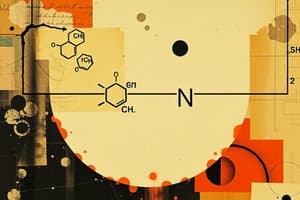Podcast
Questions and Answers
Match the following reactions with their expected outcome:
Match the following reactions with their expected outcome:
Br + NaN3 = NR H3C Br + NaOH = OH, Br Br + NaOH (excess) = OH, Br Br + CH3ONa (heat) = Anti elimination product
Match the compounds with their corresponding nucleophiles/electrophiles for synthesis:
Match the compounds with their corresponding nucleophiles/electrophiles for synthesis:
OH = Water (H2O) CH3 = Methyl iodide (CH3I) NH2 = Amine chloride (RNH3+) O = Epoxide
Match the nucleophile with its relative reactivity:
Match the nucleophile with its relative reactivity:
OH = Better nucleophile than H2O SH = Better nucleophile than H2S NH2 = Better nucleophile than OH (CH3CH2)3P = Better nucleophile than (CH3CH2)3N
Match the compounds with the faster reacting pathway:
Match the compounds with the faster reacting pathway:
Match the described reactions with their specific conditions:
Match the described reactions with their specific conditions:
Match each reaction with its appropriate outcome:
Match each reaction with its appropriate outcome:
Match the nucleophile/electrophile pairs for synthesizing the indicated compounds:
Match the nucleophile/electrophile pairs for synthesizing the indicated compounds:
Match the nucleophile with the likely reaction type that would occur:
Match the nucleophile with the likely reaction type that would occur:
Match the better nucleophile in each pair:
Match the better nucleophile in each pair:
Match the compound that will react faster in the given condition:
Match the compound that will react faster in the given condition:
Flashcards
Nucleophile strength
Nucleophile strength
The ability of an atom or molecule to donate an electron pair to form a chemical bond.
SN1 reaction
SN1 reaction
A substitution reaction where the rate-determining step involves the loss of a leaving group to form a carbocation intermediate.
SN2 reaction
SN2 reaction
A substitution reaction where the nucleophile attacks the electrophile from the opposite side of the leaving group (in one step).
Leaving group ability
Leaving group ability
Signup and view all the flashcards
Elimination reaction
Elimination reaction
Signup and view all the flashcards
SN2 vs E2 with Strong Base
SN2 vs E2 with Strong Base
Signup and view all the flashcards
Leaving Group Ability and SN1/SN2
Leaving Group Ability and SN1/SN2
Signup and view all the flashcards
Better Nucleophile
Better Nucleophile
Signup and view all the flashcards
SN1 vs SN2 with Tertiary Alkyl Halide
SN1 vs SN2 with Tertiary Alkyl Halide
Signup and view all the flashcards
Weak vs Strong Base in SN1
Weak vs Strong Base in SN1
Signup and view all the flashcards
Study Notes
SN1/SN2/E1/E2 Practice Problems
- Draw the structure of the major organic product for each reaction.
- Do not forget stereochemistry.
- If there is no reaction, write NR.
Problem (a)
- Br + NaN3 + CH3CN
- No reaction given
Problem (b)
- Aromatic ring + NaBr + OH + Pyr
- No reaction given
Problem (c)
- Aromatic ring + H3C-S-Cl + OH
- No reaction given
Problem (d)
- Br + NaOH (excess) + acetone
- No SN2 at sp2 carbon.
- Products not given.
Problem (e)
- H3C Br + NaOH
- Assume SN2
- Products not given
Problem (f)
- Aromatic ring + Na + Br
- Elimination reaction
- Products not given
Problem (g)
- Aromatic ring + CH3 CH3ONa
- Products not given
Problem (h)
- Br + CH2CH3
- Assume Elimination
- Products not given
Problem (i)
- CH3 CH2CH3 + CH3CH2Br + NaOCH3 + acetone
- Products not given
Problem 2
- Show the nucleophile/electrophile pairs to synthesize compounds.
Problem 3
- Detailed reaction mechanism for given reactions.
Problem 4
- Circle the better nucleophile in each pair.
Problem 5
- Circle the compound that reacts faster in an indicated pathway.
Studying That Suits You
Use AI to generate personalized quizzes and flashcards to suit your learning preferences.
Related Documents
Description
Test your understanding of SN1, SN2, E1, and E2 reactions with these practice problems. This quiz challenges you to predict major organic products, including considerations of stereochemistry and reaction mechanisms. Analyze various nucleophile/electrophile pairs and demonstrate your grasp of organic synthesis.




